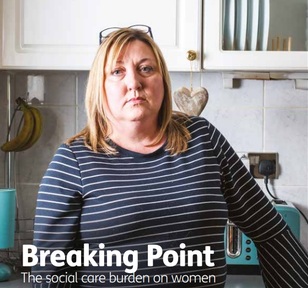It's not a 'woman's job' to look after ageing parents, says Age UK boss
"It's hard work, it's exhausting, I don't think there's a day gone by in the last three years where I've not sat there and cried my eyes out" says Sarah, who is a ‘sandwich carer’ looking after her mum and two children.

'Breaking Point'
Sarah's words are quoted in a new report by Age UK, which highlights how women are bearing the brunt of a crisis in social care provision and paying the price for a government that ‘retreats’ from its responsibilities.
Following the publication of ‘Breaking Point - The social care burden on women’, Age UK’s charity director Caroline Abrahams has questioned the idea that it is a ‘woman’s job’ to look after elderly parents in her blog ‘We need a big conversation about (women as) carers’. In the blog, she asks why caring responsibilities so often fall to women.
“We wrote this report for International Women’s Day, which this year happens to fall on the second anniversary of the Government’s so-far broken promise to produce a Social Care Green Paper – a horrible, if apt, coincidence", writes Ms Abrahams.
The charity's report highlights how 68 per cent of Britain’s 1.25 million ‘sandwich carers’ are female. There are 850,743 female ‘sandwich carers’ - defined as individuals caring for an older relative as well as children.
'Too much to keep all these balls in the air'
As many female carers keep working and try to juggle their home and care commitments, others are forced to give up their job or studies, like Sarah did, because Ms Abrahams states it is “too much to keep all these balls in the air.”
Ms Abrahams asked in her blog “Is it fair to ask women – people – to do this?” “Our case studies make clear that sometimes they effectively have no choice because of the lack of decent, affordable care for older people.”
The charity’s 'Breaking Point' report highlights the experiences of several women, including Sarah who struggled to provide care for an older relative while bringing up a family and pursuing a career.
When Sarah’s mother Jean had a fall a few years ago when living on her own, she broke her hip. After being discharged from hospital, Jean moved to live with her daughter Sarah who became her 24/7 carer.
At the time, Sarah was studying to be a nurse, and as well as caring for her mother, she looked after her two children. However, due to the pressures of being a sandwich carer, Sarah said she had no choice but to stop studying because she couldn’t manage it all. She believes more support is needed for people in her situation to keep on caring, with respite breaks given.
Age UK reveals those aged between 35-44 are most likely to be sandwich carers with 35 per cent falling in this age group. Some 88,391 sandwich carers spend more than 35 hours every week giving care.
A total of 78 per cent of sandwich carers are also in paid work. Some 49 per cent of those providing more than 35 hours of care to relatives are also in paid work.
Tackling the idea that elderly parents may prefer receiving personal care from a relative rather than a stranger, Ms Abrahams blogged: “My experience is that many older people do not want their adult children washing or toileting them and would prefer a paid care worker to do so…many adult children feel the same and I can understand why.”
’The state pimps off the goodwill of carers’
There are 1.4 million older people in Britain with unmet care needs, with a growing number of people having no family to fall back on for support. The charity director described the sacrifices made by family carers (who are mostly women) to care for loved ones as “saving the State a fortune in care fees for your parent or partner. If this isn’t unjust I don’t know what is. In this respect the State definitely has its cake and eats it at the moment.”
Ms Abrahams also said no government has “so far used its muscle to make flexible working the default option.”
“In effect, the State pimps off the goodwill of carers. I think we need a big public conversation about what it is right to ask carers – often but not always women – to do, and what we should give them in return, and I hope that the Green Paper – if we ever see it – kicks this debate off.”
Latest News
 29-Jul-24
Dementia Bus gives carehome.co.uk staff insight into life with dementia
29-Jul-24
Dementia Bus gives carehome.co.uk staff insight into life with dementia
 27-Jul-23
UK's top home care agencies in 2023 revealed
27-Jul-23
UK's top home care agencies in 2023 revealed
 30-Nov-22
A quarter of older people keep their falls secret from family
30-Nov-22
A quarter of older people keep their falls secret from family
 29-Nov-22
'Covid-19 has not gone away' say terminally ill
29-Nov-22
'Covid-19 has not gone away' say terminally ill
 28-Nov-22
IT consultant who received poor care opens 'compassionate' home care business
28-Nov-22
IT consultant who received poor care opens 'compassionate' home care business